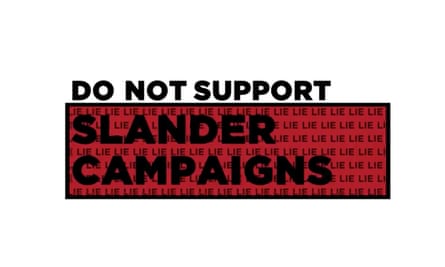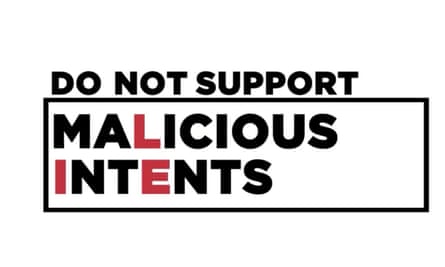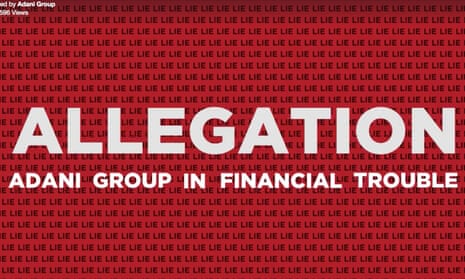The Adani Group has promoted a bizarre video advertisement on Facebook, in which the Indian company responds to revelations its Australian coal operations face growing financial risks.
The video, targeting people in Melbourne, flashes up text on the screen, backed by fast and upbeat percussive music. It displays “allegations”, which are labelled as “lies”, followed by attempts to set the record straight. It also misspells “Abott point”, its coal terminal.
This article includes content provided by Facebook. We ask for your permission before anything is loaded, as they may be using cookies and other technologies. To view this content, click 'Allow and continue'.
The video was uploaded along with a long post that contains strange defences of its operation, including the false claim that the entire allegations about the company are based on “just one screenshot of random text”.
The Facebook post had more than 580,000 views on the video statistics at the time of writing.

Tim Buckley, a financial analyst at the Institute for Energy Economics and Financial Analysis, made many of the allegations Adani was attempting to refute. Aired in an episode of ABC’s Four Corners program, the institute claimed Adani’s operations in Australia were unprofitable and required the Carmichael mine to bail them out.
Buckley described the video as a “desperate attempt to try and counter some of the facts with loud music and flashing lights” and a sign that the campaign against Adani in Australia is having an impact.
“In one respect it shows that Adani is taking it seriously,” Buckley said. “The whole campaign in Australia is doing enormous damage to the social licence to operate of Adani.”
The ad has been uncovered by a Guardian Australia and ProPublica collaboration to track political advertising on Facebook.
Facebook ads are “sponsored” posts that an advertiser has paid to push into the news feed of a specifically targeted pool of people. Unless the ad appears in your feed, there is no easy way to determine that a post has been sponsored. This makes it difficult to keep track of political advertising on the social network.
Facebook advertising is considered effective because it allows messaging to be fed to a very specific audience based on demographics and interests. In this case, the Adani ad was aimed at targeting “people ages 18 and older who live or were recently near Melbourne, Victoria”.
The video was posted on 17 October, about two weeks after Four Corners aired a report about the escalating financial risks of Adani’s operations in Australia, including the Abbot Point coal terminal, and the proposed Carmichael coalmine.
Much of the Four Corners story was based on a detailed report by the Institute for Energy Economic and Financial Analysis (Ieefa), which said the push to develop the Carmichael mine appeared to be a desperate attempt by Adani to save its unprofitable and debt-ridden Abbot Point coal terminal.
It also revisited the allegations of financial and environmental crimes committed by the Adani Group and its senior executives, including those allegations revealed by the Guardian.
Adani says the post was a response to a GetUp video, which itself was a summary of the Ieefa and Four Corners reports.
The company’s post said: “The entire baseless accusation on Adani is based on just one screenshot of random text with no mention of its origins or reference.”
However, the Ieefa report is publicly available, and contains a long list of references, also available to anyone. The allegations of tax avoidance are based on many documents, including a leaked investigation from the Indian directorate of revenue intelligence, which the Guardian has published.
One key part of the Ieefa and Four Corners report was the fact that the existing Abbot Point coal terminal had been operating at only 50% capacity, adding to evidence the port’s viability was tied to the successful development of the Carmichael coal mine, which will fill the rest of its throughput.
The Facebook post says: “The Abbot Point Coal Terminal has consistently delivered 100% of supply-driven throughout and is not a low utilisation of Asset.” However, government data from the North Queensland Bulk Ports Corporation – collated in the Ieefa report – shows the port has averaged just over 50% utilisation since the beginning of 2015.
The advertisement attacks the idea that Abbot Point is unprofitable by making an unusual claim: “The capital structure of Abbot point is rated by rating agencies and has investment grade rating from S&P (BBB-),” it says. However, BBB- is the lowest investment grade rating, below which assets become known as “junk bonds”.

Buckley and one of the authors of the Ieefa report said that particular company (Adani Ports and Special Economic Zone Ltd) with the poor rating was the only publicly listed company in the Adani group, and the only one in the group that had a credit rating at all. “That listed company is totally removed from the operations in Australia,” Buckley said, adding that if any other group company had a credit rating, it would be even lower.
At the end of Adani’s post, it makes a passing reference to GetUp, suggesting the post was also motivated by one of their videos. “The analysis of the nos. from the balance sheet by Getup is not correct. In fact, the whole video is a bundle of lies,” the post says.
GetUp posted several videos after the Four Corners story, including one that summarised the findings of the Ieefa report.
This article includes content provided by Facebook. We ask for your permission before anything is loaded, as they may be using cookies and other technologies. To view this content, click 'Allow and continue'.
A spokesman for Adani told the Guardian the video was a response to a GetUp video, which included “a non-sourced frame of allegations”.
The Adani spokesman insisted that the Abbot Point terminal operated at full capacity. “AAPT maintains its position that 100 per cent of supply side throughput has been delivered since the asset was acquired by Adani,” he said. “Contracted capacity, both for counter parties and quantities, is commercial information that we are restricted from sharing due to confidentiality conditions associated with our customers.”
If you would like to participate in our project to increase the transparency of political advertising on Facebook, go here.

Comments (…)
Sign in or create your Guardian account to join the discussion